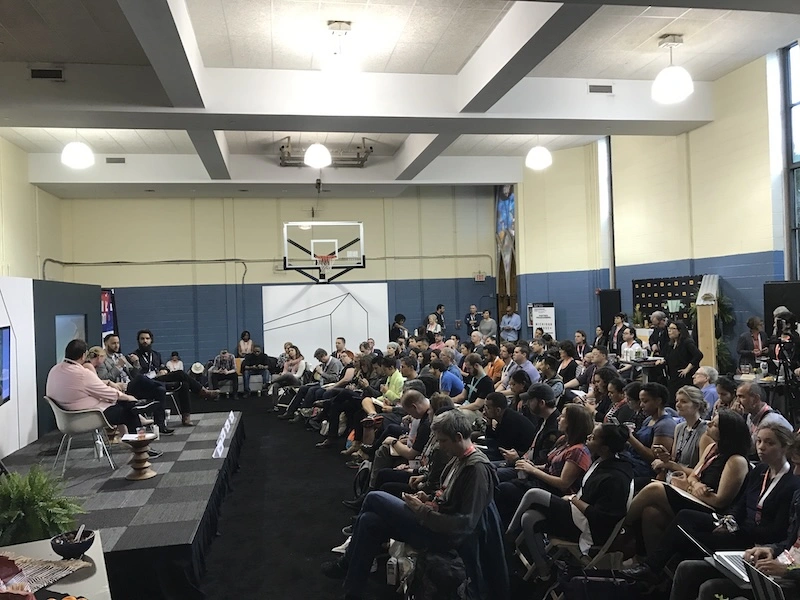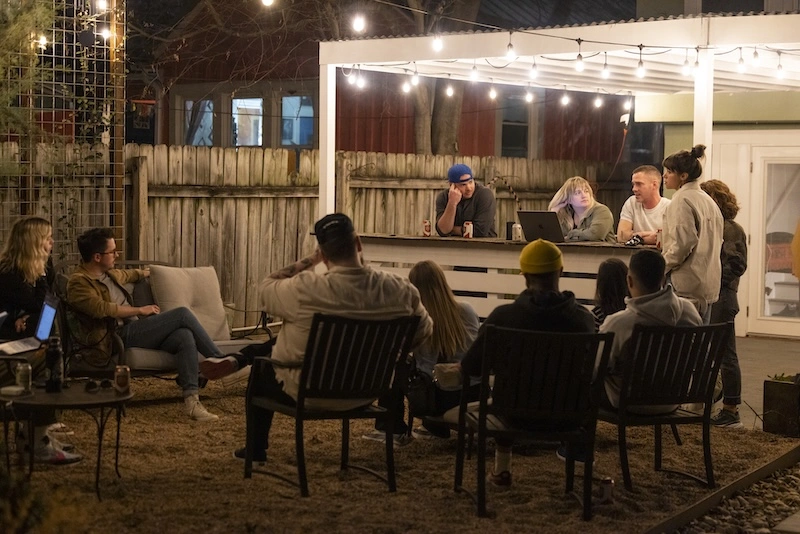
Become a member & keep reading for free, or choose a paid membership.
Access all our content & email newsletter

This is the second in a two-part series on the history of Midwest House the first of which was published here. It is part of StartMidwest’s ‘Homecoming Week’: presented by the Midwest House Summit, taking place December 3-4 this year in Grand Rapids, Michigan. Get your tickets here and use the term "OPE2025" to get 10% off.
Before the Covid shutdowns and most jarringly the cancellation of SxSW in March 2020, seeds had been planted on a name change. In 2019, Ted had met Wolf Starr, a Columbus, Ohio-based VC. Wolf wanted to run a ‘Columbus House’ at SXSW and had picked Ted’s brain on the how-to and why-for. Two months after the 2020 cancellation, they were commiserating by phone when the idea fell out, almost annoyed with itself. As Ted says, “this was so stupid. We were both going to go down there, spend all this money to rent a venue, going to do it in separate places… Why wouldn't we have just done this together? The whole point of going is to meet new people and connect people.”
The first Midwest House in 2022 was, by Ted’s own telling, ‘Midwest’ mostly by name, but still a bit Michigan-heavy. But the very concept and idea behind the name change had raised the ceiling. They started going to things in Chicago, then Indiana, meeting people and building connective tissue. Again and again, they found the same pattern: a great VC in Chicago didn’t necessarily know a perfect founder in Ann Arbor; an industry-focused accelerator in Wisconsin didn’t have a line into Columbus to find the talent in their industry. Everyone was busy. Everyone was local… and everyone was missing out. Maybe Midwest House could become part of the routing mechanism?
That’s where Ted’s writer-as-host metaphor became a blueprint. “You’re trying to create a dinner party,” he says. “Who’s going to talk to who, who’s going to connect with who.” It’s not about the staged photos, it’s about what happens behind the camera, because the room was curated like a scene in a novel. “If two people that you meet at Midwest House do business together, that’s like you’re getting to see your novel come to life.”
The gravitational pull of the coasts made our own gravity in the Midwest feel optional. It’s not that coastal networks are bad; it’s that they shouldn’t be required for validation. The antidote is not to stop going to the coasts; it’s to build a region that recognizes itself.
But the region is not one thing. It’s a cluster with different strengths: Detroit’s mobility; Chicago’s scale; Columbus’ enterprise backbones; Madison’s bio; Ann Arbor’s research; Minneapolis’ medtech; Indianapolis’ marketing platforms.
The community effect
Ask Ted what he’s proud of, and he doesn’t point to a single activation or a specific marquee sponsor. He talks about norms that changed. “People don’t think it’s a weird idea anymore for founders in Chicago to want to know what’s happening in Detroit,” he says, the days where “for them to feel like there was any kind of validation from something they needed someone from the coast to tell them it was good” were starting to recede. There was more confidence in a regional identity.
Then he tells us a story that may as well be a parable about the whole thing we’re trying to explain here, dear reader.
In 2023, James Mikrut was running a small marketing business in West Michigan and hacking at nights on a content management product which would come to be known as Payload. He came to SXSW and met another founder at Midwest House who was a Y Combinator alum. That founder gently pushed him to go ahead and apply for the legendary west coast accelerator. He did so, got in, and “within… four months had raised… $4.5 million.” Two and a half years later, the company was acquired by Figma, “about a month before Figma IPOed” according to Ted. The founder might never have gone to SXSW alone and might never have run into someone who both understood his situation and could also offer an ear. He needed a room to make the next chapter for his business not just possible but plausible. Midwest House gave him one.

There are dozens of these stories, many of them smaller and quieter: a first job in tech, a first customer, a first co-founder. If Michigan House was an answer to “How do we show up in Austin?” then Midwest House became an answer to “How do we show up for each other?” The event is just an excuse. The real product is the network density that is sometimes missing elsewhere for founders and creators in our region.
Homecoming
If the first decade was all about taking the Midwest to Austin, the next might well be about how to bring the world to the Midwest. Ted calls it a bookend: a fall “homecoming” that detonates - in the best possible way - this December in Grand Rapids.
“If you create that space in a city,” he says, “that changes that city forever. I feel like by holding this event in my hometown 50 different things are going to happen because of that ” He reaches for a metaphor, “it's like a bomb of inspiration and it will spread and the places that are nearest to it are gonna get the most out of that.”
And yes, there’s also pride in choosing Grand Rapids for those reasons: “We can do cool s*** here. You don’t need to be in LA. You don’t need to be in Austin to hold an amazingly impactful innovation event.”
That homecoming concept loops back to what South By itself did for Austin - “20 years ago [it] was… far smaller,” Ted notes, but the event helped the city metabolize its own potential and it is now a known hub for innovation, alongside arts, culture and music.
But Grand Rapids isn’t trying to be Austin. The Midwest shouldn’t try to be the Bay Area, and we actually think it would be a mistake to even try. The point is to borrow the catalytic function of such events and translate that into momentum.
Midwest House packs founders, investors, artists, civic leaders, students, and Fortune-500 scouts into a space where proximity does what it always does: luck accelerates.
It's the ethos that lasts
Event work might never give you the control of being a fiction writer, but it will hand you a better plot twist than you could have written.

And the Midwest part matters. It’s not a niche; it’s a stance. The house works because the people inside it recognize themselves in each other - different cities, same instincts. The coasts are great, but the Midwest is home. A house is home.
“Midwest House really has 100 odd founders. There's Jamie Kirby, Peter Jacob, and I who started the thing, but there's also Peter Fox who recorded 10 bands in a kitchen in year 1. There's Bethany Rabbitt who used to fly home from France just for Midwest House. Edgar, Amy, and Lydia who created the look and feel. Joe Voss who got us our first sponsorships. So many partners and sponsors and contributors who put a little bit of themselves into our House. I could never have written what it's become."
That’s the real story here.
Not a single huge moment or a single person, but a thousand small ones. A region deciding to act like a region. A house with its doors propped open. In hard earned style.
Trending Stories




